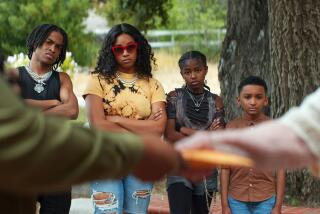First, the Crazed Careerist; Now, the Killer Nanny : Guilt: The media leap on any story that shows bad things happening to women who work.
Spurred by the new hit movie thriller, “The Hand that Rocks the Cradle,” the news media have found another horror story from the lives of working women: The Au Pair Girl from Hell. The film, about a nanny who seduces a husband and terrorizes a child, spawned network TV and print stories with scary headlines like Newsweek’s “Nervous About Nannies.”
Reporters beat the bushes to find a minuscule number of cases where baby sitters abused--and in one case killed--a child. Every journalist knows that if you look hard enough, you can find horrible examples of anything. But here’s the truth: If you really want to find out who’s abusing children, look first at the Boy Scout Troop leader, the local minister or grandpa, Mom’s boyfriend--sometimes even Mom herself. In most cases it’s the relatives, not the hired help, doing the abusing.
So why all the fuss? Because under the headlines is a cautionary tale: When mommies go to work and don’t stay home where they belong, terrible things happen. That’s so ingrained in our mythology that we tend to believe it. It’s why every shred of bad news about working women manages to find its way to Page 1.
Remember the “mommy track?” Working women were going to be so stressed out that they needed a “slow lane” designed for them. Or how about the predictions that working women would drop dead from heart attacks--or at the very least their children would be wrecks. As for the movies, when they aren’t giving us killer nannies, they portray working women as seductive psychos, a la “Fatal Attraction,” where the good stay-at-home wife has to literally kill the crazed female careerist to protect home and family.
These stories prey on the guilt of working women--and their husbands. When my husband reads them, he feels pangs of guilt about having left our kids with baby sitters. He asked our son, now grown, if any of his caretakers had mistreated him.
“You mean besides Mom?” he said with a grin, giving old guilt the serious attention it deserved.
The headlines also preserve a mythology about miserable working women and wretched kids that should have died long ago. Decades of research have found virtually no difference in any areas of development between children of working mothers and those of at-home mothers. As for stress-induced heart attacks, a major federal heart study reports that working women do not show increased coronary symptoms. In fact, as women enter the work force, their life-span advantage over men increases. Two decades of research consistently shows that working women are both physically and emotionally healthier than non-employed women. Moreover, women who drop out of the work force are at risk for depression; one study found the birth of a first child causes depression only if it forces the mother to leave her job.
But the ersatz bad news will continue to pop up in headlines. This is partly a hangover from the postwar era, when women had to be pried loose from their jobs to make room for returning soldiers. The result was a barrage of propaganda turning at-home moms into saints.
When society needed Rosie the Riveter, she became a national heroine and day-care centers sprung up overnight with no hand-wringing about what kids would do without Mommy from 9 to 5. After the war, if Rosie didn’t get back to the kitchen, she turned from Patriot into Bad Mommy.
So I wonder what scare story will be next? Rabid deer that crash through windows and bite children while Mommy is at work? Preschool van drivers who chauffeur the kiddies to sweatshops each day instead of to Sunshine School? (My own favorite, when my kids were little, came from a relative who swore that she knew of a baby sitter who took LSD and put the baby in the oven and the roast beef in the crib. I had several graphic nightmares over that one.)
Will all of this change? Not soon. Rest assured that if the news is bad and you’re a working mother, you’ll hear about it.
More to Read
Only good movies
Get the Indie Focus newsletter, Mark Olsen's weekly guide to the world of cinema.
You may occasionally receive promotional content from the Los Angeles Times.










